Menu
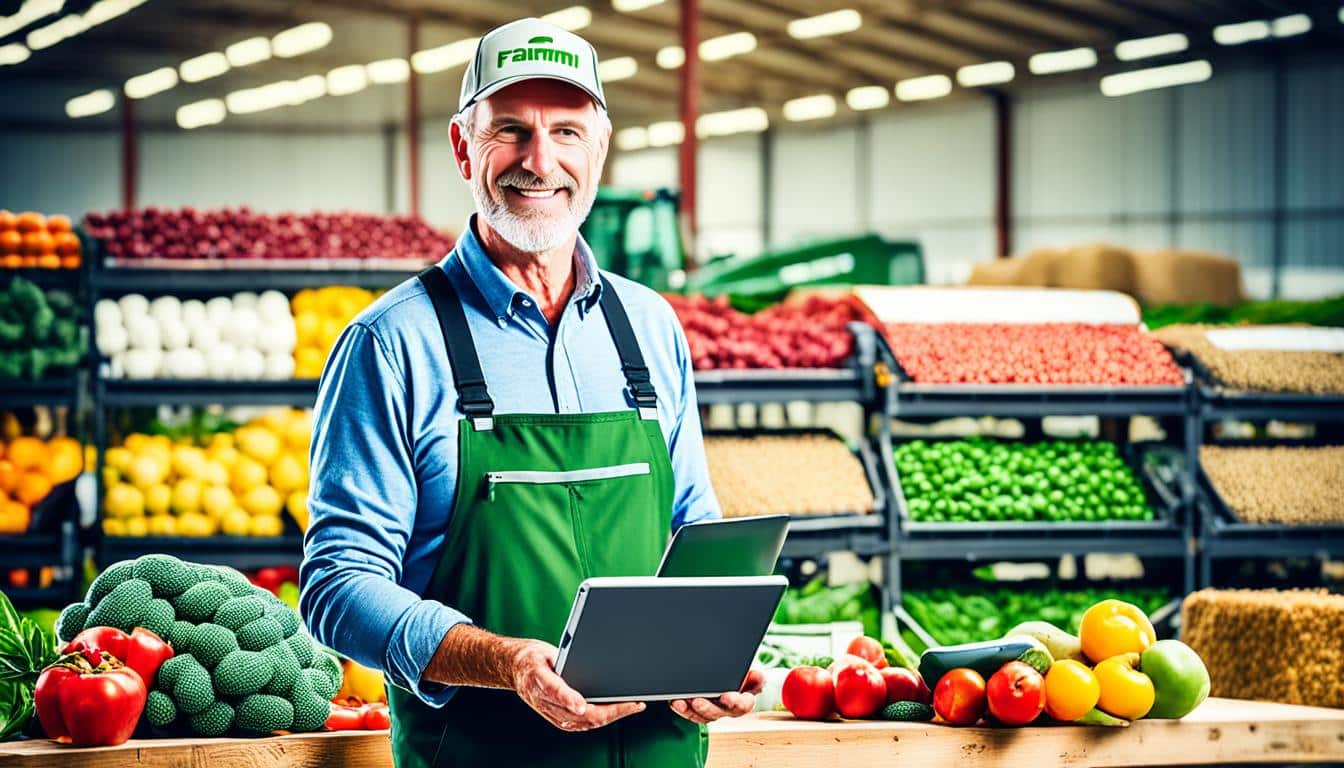
Did you know e-commerce helps farmers reach people worldwide? This can boost their profits and make them more visible in the market.It allows farmers to sell produce directly. The online farmer’s market lets them use technology to reach more people. And manage prices, improve their brand image, and cut out middlemen.
Choosing the right e-commerce platform is crucial for farmers. It impacts how easy it is to sell online, the cost, and features for farming. Platforms like Square are cost-effective, ranging from $0 to $79 a month plus a fee per transaction. Shopify, on the other hand, costs between $29 to $299 monthly. The choice is important for a farmer’s success.
Square’s Premium plan at $79 a month includes real-time shipment rates. This can be essential for sending produce.
This guide is for farmers moving into the digital world. It provides tips on choosing the right e-commerce platform for farming needs. It aims to help start a successful and growing online farm store.
E-commerce has changed how farmers sell their produce. This change allows them to sell to people worldwide through online stores and stands. Now, farmers can meet the increasing consumer demand for local products thanks to e-commerce.
In 2020, e-commerce sales globally hit an amazing 4.28 trillion US dollars. By 2022, this number is expected to grow to 5.4 trillion. Online sales are very important for business now. For agriculture, the digital market was worth 6.64 trillion dollars, with North America making up 14% of that.
In the U.S., e-commerce food and drink sales were 18.7 billion dollars in 2020. These numbers are predicted to grow to 25.7 billion by 2025. This shows how important selling online is. It also shows how virtual farm stands help farmers sell their products directly to people.
Using e-commerce can make farmers more money and help them work better. By using online tools, farmers can find what’s not working, make things automatic, and improve their business. Selling online also lets them reach more customers. Customers can buy from farms using websites, through email, and in other ways.
Farmers can sell directly to shops, restaurants, and people with farm-to-consumer platforms. This helps them find new customers and make more money. These platforms also make it easy for customers to see what’s available and to make orders. It makes buying from farmers convenient.
For farmers to sell online, they need to know about technology and make smart plans. They have to think about many things like how to show their products, how to get paid, how to promote their goods, and how to help customers use their website. They also need to think about where they will get their products, how they will keep them, how they will send them, and how they will follow the rules.
To do well in online selling, farming businesses should understand what their customers want. They should plan carefully, show their products well, and make sure customers feel special. They should also work on keeping customers loyal, watching how things are going, choosing the best online selling partner, connecting everything well, and starting to sell online carefully.
By doing these things right, farmers can sell well online and make more money. It’s all about using the digital market in the best way to grow and succeed.
E-commerce platforms are changing farming for the better. They bring big benefits like reaching more customers and making more money. Also, they let farmers set their own prices. This new way of selling has helped many farmers.
Now, farmers can sell to people far away through e-commerce. Using special platforms, they can reach 40% more customers. These platforms help connect farmers directly with buyers. This makes the whole process faster and better for everyone.
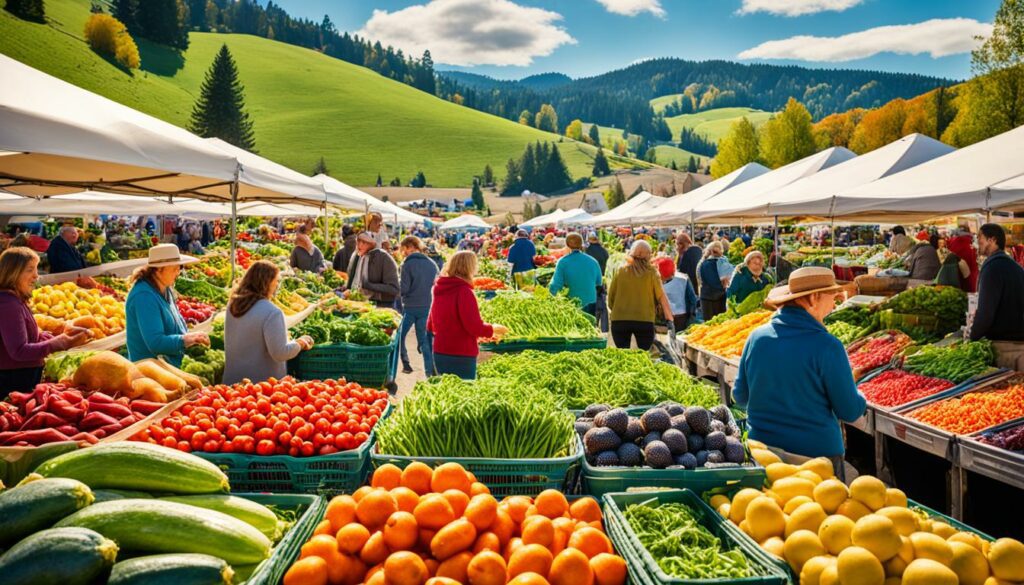
Selling online cuts out the middlemen, which means more money for farmers. It can save them 30% on costs. By selling direct, farmers get to keep more of their earnings. This has made a big difference to many farmers’ businesses.
E-commerce gives farmers more say in how much they charge. They use data on what customers look at and click on to help set prices. This strategy has led to a 50% improvement in picking the best farm products. Farmers are choosing smarter, and it’s making their businesses stronger.
| Benefit | Statistic |
|---|---|
| Time Saved | Up to 70% |
| Market Reach Expansion | 40% Increase |
| Cost Savings | Up to 30% |
| Informed Decision Making | 50% Increase |
| Loan Facilities Uptake | 25% Opt-in |
The digital market can change farmers’ lives by letting them reach more customers. They can sell directly and increase profits online. To take this step, farmers need to know which platforms and strategies are best. This guide will help them start e-commerce the right way.
Choosing the best e-commerce platform is key. Many options are designed for selling farm goods, each offering something different. For selling meat, GrazeCart is a top pick. It lets you sell by the variable weight. Shopify suits farmers with a lot of products that want to ship across the country. It offers many designs and tools. Picking the right platform is crucial for success in online selling.
Once the platform is chosen, making a seller account comes next. Square and WooCommerce make the setup easy. You just follow their steps to enter your business info, agree to the terms, and verify your account. Getting this done right is important for later managing sales and what you sell online.
After your account is set up, focus on making your online store look good and easy to use. List your products and set prices carefully. Use the platform’s tools to improve how often people find your store and how they like it. Make sure your products look great in photos, have full details, and are priced well. Use everything the platform offers to make your store unique and attractive.
Below is a comparison table of platform costs and features to guide your selection:
| Platform | Monthly Cost | Transaction Fees | Key Features | Best For |
|---|---|---|---|---|
| Square | $0-$79 | 2.9% + $0.30 | Mobile solutions, inventory management | Small to medium farms |
| Grazecart | $149-$399 | N/A | Variable weight sales, customization | Small farms selling meat |
| Woocommerce | Varies | 2.9% + $0.30 | High customization, WordPress integration | Experienced users |
| Shopify | $29-$299 | 2.9% + $0.30 | Large catalogs, nationwide shipping | Large product listings |
| Squarespace | $27-$49 | N/A | Professional templates, marketing tools | Less than 50 items |
It’s key for farmers to know what makes a good e-commerce platform. The world spent 4.28 trillion US dollars online in 2020. By 2022, this could hit 5.4 trillion US dollars. This shows how big online markets are. Each farming platform is unique but certain traits make them successful.
Being easy to use is crucial. Platforms should work for everyone, even if you’re not great with tech. They should also offer good help. Tutorials and customer service are super important for starting a new online store.
Tools to manage products well are a must. They help with stock, sales, and delivery. These tools make everything run smoother. In 2020, the B2B online market was worth 6.64 trillion US dollars. That’s evidence of how useful these tools can be.
Connecting directly with buyers is a huge benefit. It cuts out the middlemen, reaching buyers straight. This isn’t just about better prices. It also gives farmers more say in their products.
Sign-up, orders, talking with customers, and rating products should all be easy. This makes using the platform simple and successful. In 2020, North America made 14% of all B2B online sales in farming. This success was partly because of these easy features.
Platforms that help you sell better are also a big plus. They offer ways to market, like sending emails and using social media. The U.S. food and drink e-commerce market is expected to grow. It could go from 18.7 billion dollars in 2020 to 25.7 billion by 2025.
| Key Traits | Benefits |
|---|---|
| User-friendly Interfaces | Accessible for farmers with varying technical skills. |
| Efficient Product Management | Streamlined inventory and sales data management. |
| Improved Market Linkages | Direct connections between farmers and buyers. |
| Promotion Tools | Enhanced visibility and customer attraction. |
| Support Structures | Access to tutorials and customer service. |

For farmers going online, choosing the best e-commerce platform is key. Among many choices, GrazeCart, Shopify, and Square are top options. They provide specific benefits such as easy processes and fair costs. Let’s look closer at how these platforms can help farmers in the online market.
Designed for those selling variable weight products like meat, GrazeCart fits agricultural needs perfectly. It allows for various sales methods and personalised online shops. Its prices vary from $149 to $399 a month. This investment helps farmers create an online store that speaks to their audience.
Shopify is for everyone, including farmers, with its wide variety of features. It accommodates 4.8 million online shops. For $29 to $299 a month and a transaction fee, it’s accessible. Its standout features are easy use, many marketing options, and global reach, boosting farmers’ online presence quickly and safely.
Square is known for straightforward, mobile-ready online stores – a great fit for farmers. It’s free to $79 per month, with a transaction charge. The platform excels in mobile selling and managing stock well. Its insights and analytics tools aid farmers in making smarter decisions for their online stores.
Deciding on GrazeCart, Shopify, or Square depends on what you need and your budget. Each platform has its own benefits, keeping them at the top for farmers in the online world.
GrazeCart is made for small-scale farmers. It provides key features for their farming needs. With GrazeCart, farmers can improve their online stores. This helps their business grow and reach more people in the farming world.
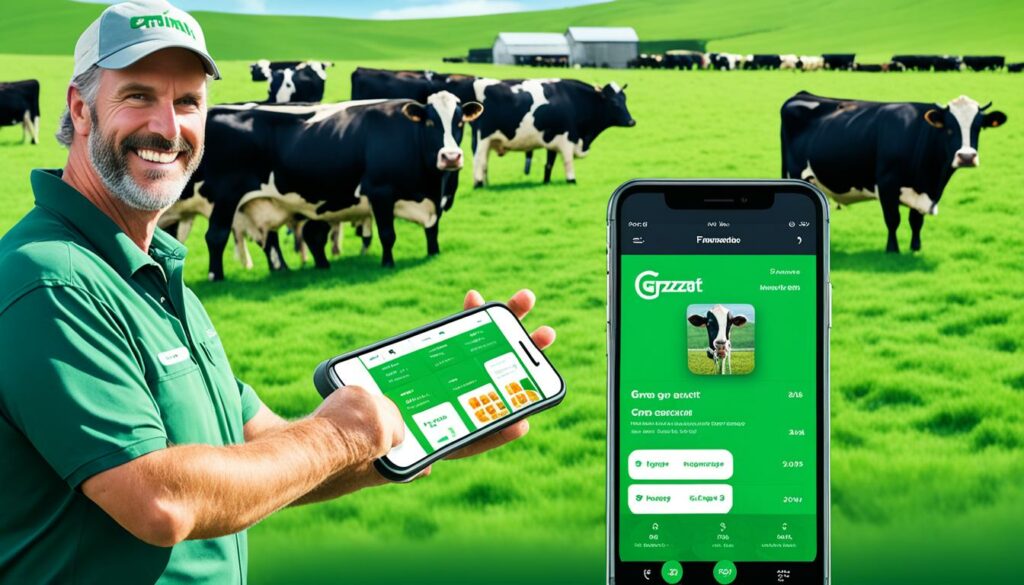
GrazeCart stands out with its feature for selling items by weight. This is great for farmers who sell meat or fruit. It means they can price things accurately and keep track of their stock well. It’s a unique feature that helps GrazeCart shine for those farmers.
Using GrazeCart, farmers can make their online shops look and work just how they want. The drag-and-drop builder makes it easy, even if you’re not great with tech. There are lots of design choices. This lets farmers show off their brand and connect better with customers.
GrazeCart boosts how farmers engage with their local community. It offers things like local pickup and delivery across the country. Plus, there are tools to talk directly to customers. These features help farmers keep people loyal and support buying straight from the farm.
| Platform | Key Features | Pricing |
|---|---|---|
| GrazeCart | Variable Weight Sales, Customised Storefronts, Community Engagement Tools | $149 – $399/month |
| Shopify | Subscriptions and Local Delivery, Real-time Carrier Rates, Third-Party Integrations | $29 – $299/month |
| Barn2Door | Sell-by-weight, Pay-as-you-go Subscriptions, Marketing Services | Custom Pricing |
Shopify is known for helping farmers sell online easily and fast. It’s perfect for people just starting or those with experience in online sales. Farmers love its many templates that make their stores look great without much effort.
Setting up a Shopify store is simple. Even if you’re not a tech expert, you can have your store running fast thanks to its design tools and templates. This makes it perfect for farmers who want to sell online without the hassle.
Staying safe online, especially in farming, is really important. Shopify makes sure all sales are safe with top-notch security. It keeps all customer data and transactions secure. Plus, its fees are clear and fair at 2.9% + $0.30 per sale.
With Shopify, farmers can sell to people worldwide. This opens the door to more sales opportunities. It offers payment options like Shop Pay Installments and Afterpay to make buying easier for customers. Shopify has plans for everyone, from $29 to $299 a month.
Shopify is the best choice for farmers wanting to sell online. It combines easy use, secure selling, and a chance to sell around the world. By using Shopify, farmers can grow their sales big time and reach more customers across the globe.
Square has changed the game for farmers online with its easy platform and full set of features. It helps farmers run their business easily, whether selling on the move or checking key data. Farmers can now serve their customers better and meet their demands well.
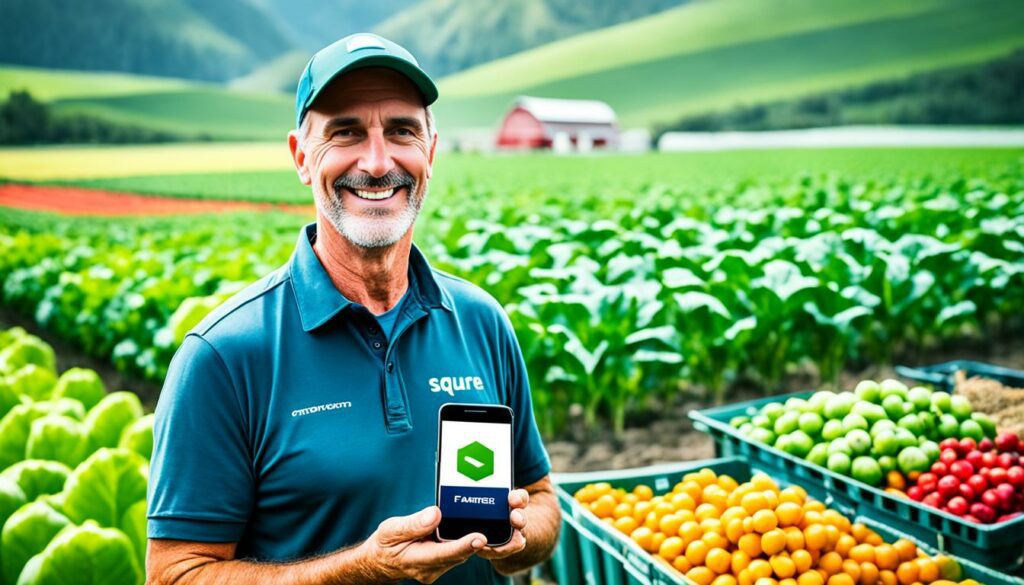
Square mobile e-commerce turns farmers’ devices into cash registers. This is great for busy markets as it lets farmers sell on the spot. It adds new ways to make money and makes shopping smoother for customers.
Square shines with its solid farm inventory management system. It lets farmers keep perfect stock records, update each sale’s stock, and save money from every purchase. This smarter way of pricing and ordering stock helps farmers grow their business.
E-commerce analytics for farmers by Square are eye-opening. It shows how customers buy and where the market is going. Smart reports help manage money, cut costs, and keep customers through good programmes. This info on customers and trends builds loyalty and value.
Square also has top tools like managing staff and easy payment, including Afterpay. Farmers can sort staff shifts in many places, handle tips and pay, and watch their money with Square Checking. No matter the sales size or market, Square is a must-have for farm selling online.
For farmers to reach more people, they need a good-looking online store. Squarespace offers beautiful templates, great marketing features, and strong customer help. I’ll look into these benefits next.
Squarespace’s templates make creating a pretty and true-to-brand store easy. They let farmers highlight their goods well. Farmers can make their shop stand out while keeping the buying process smooth for customers.
To reach more customers and sell more, farmers need smart marketing. Squarespace comes with tools like email marketing and good SEO. With these, farmers can attract customers with new items and deals.
In the complex world of online sales, good customer support is vital, especially for new farmers. Squarespace’s support is always there, with 24/7 help, detailed guides, and forums. This help allows farmers to focus on their business growth.
In conclusion, Squarespace shines with its templates, e-commerce tools, and support. It’s great for farmers moving their sales online. These tools are designed specifically for farmers to do well in the digital market.
WooCommerce is great for farmers. It connects well with WordPress. This makes it easy for farmers to boost their online sales.
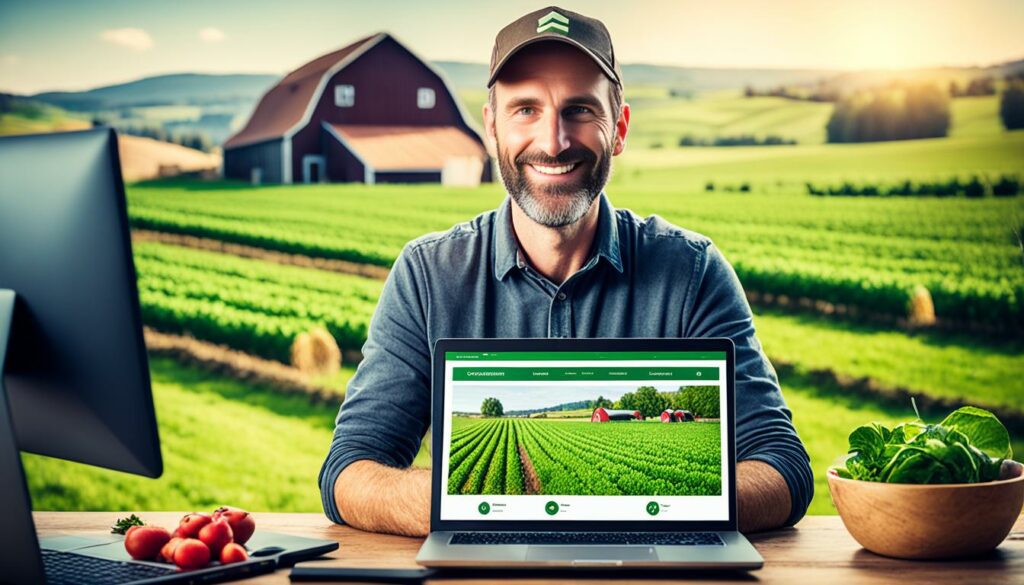
WooCommerce is simple to use with WordPress. It lets farmers sell online without hassle. They can make their online shop fit their farm’s unique style.
On WooCommerce, farmers can sell a wide range of products. From veggies to crafts, everything can be listed. This makes it easier for customers to find and buy what they need.
With WooCommerce, farmers can sell worldwide. It supports various shipping options and currencies. This helps farmers grow their customer base globally while keeping their service quality top-notch.
WooCommerce is a key tool for farmers in online selling. Its blend with WordPress makes managing diverse products easy. This way, farmers can reach more people and sell more goods.
For farmers wanting to grow their online footprint, good marketing support is key. E-commerce sites offer a range of tools. These tools boost visibility, up sales, and strengthen connections with customers.
Lots of e-commerce platforms provide SEO tools. These are made to help products get seen more on search engines. Using these tools can make a farm’s products show up better online. It draws more visitors and turns them into buyers.
Being able to use social media with online stores is big. It lets farmers reach more people easily. With this link, marketing on social media for farm products is smooth. It can turn fans into committed buyers and spread the word about their brand.
Emails are a top tool for keeping in touch with customers and boosting sales. E-commerce lets farms send targeted emails. These can include deals, updates, and newsletters. The content is custom-made for what the farming community needs.
Check out the support you might get from top e-commerce platforms in the table below:
| Platform | Subscription Cost ($/month) | SEO Tools | Social Media Integration | Email Marketing |
|---|---|---|---|---|
| Square | 0-79 | Yes | Yes | Yes |
| GrazeCart | 149-399 | No | Yes | Yes |
| Shopify | 29-299 | Yes | Yes | Yes |
| Squarespace | 27-49 | Yes | Yes | Yes |
| WooCommerce | Variable | Yes | Yes | Yes |
Today, farm order fulfilment is key for success in online markets. New tech makes shipping easier. So, farmers should use the best solutions for their needs.
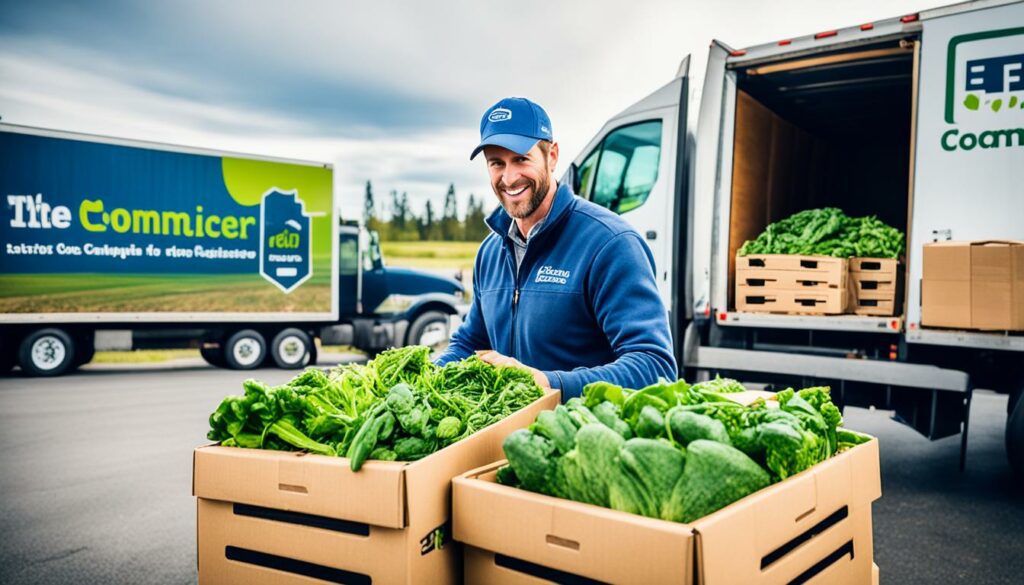
Local delivery speeds up getting fresh produce to customers. By using these services, farmers can offer reliable and quick delivery, making customers happy. Local Line helps ship local produce across the USA, Canada, and some European countries.
Setting up pickup points at farms gives customers another option. This method is cheaper and builds community spirit. It’s important pickups are easy to get to and well-organised for best results.
Zoning shipping areas helps manage logistics and keep costs down. It lets farmers send their goods further, keeping everything fresh. This way, farmers reach more people, supporting larger e-commerce efforts.
In a great move, Chipotle and Local Line work together in the ‘Local Farmer Grant Program’. It helps thousands of farms get more support and be seen. Good shipping and pickup plans also build trust and efficiency in farming.
Figuring out the costs of e-commerce platforms for farmers is tough. It’s important to look at subscription and transaction fees, plus what extra features cost. Knowing these details helps farmers choose wisely. They can pick what helps them sell online the best.
Keeping an online store running means looking at subscription prices. Shopify’s options include Basic ($19/mo), Shopify ($49/mo), and more, up to Plus ($2,300/mo). BigCommerce also has various levels like Standard ($39/mo) to Pro ($399/mo). Weebly, on the other hand, starts with a free Basic plan, then Personal for $10/mo, and Performance for $26/mo. It’s vital to pick a platform that’s both affordable and meets what you need.
Fees for selling online can affect how much money you make. Shopify, for example, changes these fees based on the plan. Woo Express might be cheaper, starting at $39/mo. Sellfy’s Starter ($19/mo) includes a limit of $10,000 in sales before you pay more. It’s key for farmers to think about these charges to make sure they don’t lose out on profits.
E-commerce platforms also offer cool extra features for better online stores. For instance, GrazeCart has tools like those for community engagement that could be worth extra money. Wix boosts things with great SEO and fancy templates in their Business Elite plan at $159/mo. Farmers need to consider if these add-ons are worth it for their business.
| Platform | Subscription Costs | Transaction Fees | Additional Features Cost |
|---|---|---|---|
| Shopify | $19 – $2,300/mo | Varies by plan | Based on features |
| BigCommerce | $39 – $399/mo | Standard rates | Based on features |
| Weebly | Free – $26/mo | Standard rates | Based on features |
| Sellfy | $19 – $99/mo | $10,000 sales cap on Starter | Multi-channel selling |
Comparing e-commerce platforms well lets farmers pick the best one. They should look at all costs like subscriptions, transaction fees, and what extra features they get for their money. This way, they get good value and something that fits their farm.
Looking at successful farm e-commerce sites helps us see how different platforms work. Let me share three stories that show the power of selling online for farmers.
KatyDidHill is a great example of a Shopify site. It’s designed to be both attractive and user-friendly, making shopping easy for customers.
Transactions are safe, boosting trust. Shopify’s global reach helps KatyDidHill appeal to customers all over, using many payment options.
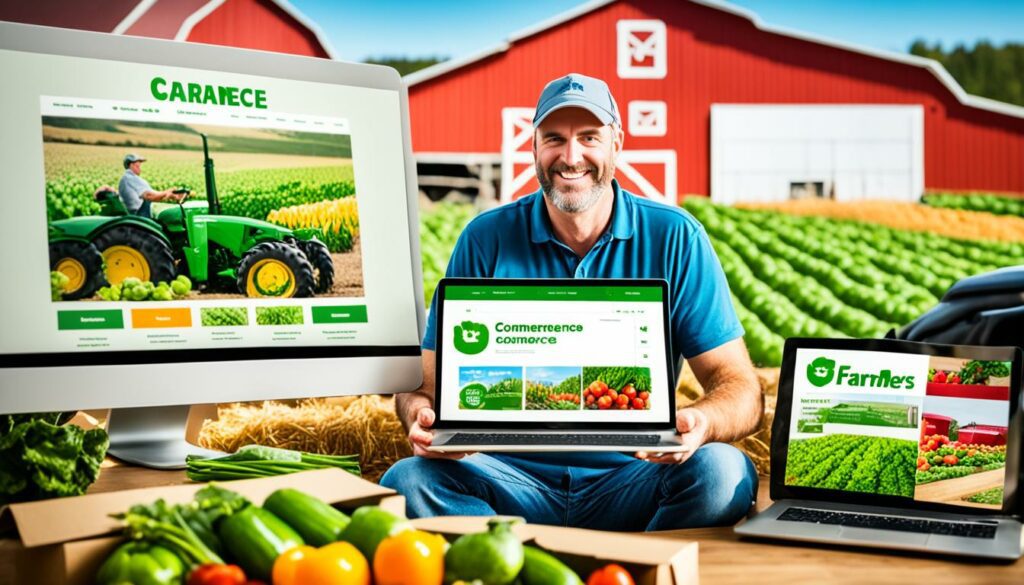
FullHandFarm uses Square for its online selling. Square makes payments, including credit cards and contactless, very easy.
It’s cheap to use and integrates well, helping FullHandFarm run smoothly. This lets the farm focus on providing top-quality produce.
MiddleGround-Farm shines with Squarespace’s help. Its site looks professional and works well, drawing in customers.
Setting up was easy thanks to Squarespace’s templates and support. This professional touch helps make online sales easy and effective.
E-commerce is changing farming, offering farmers big chances to grow their business and connect with customers. They can now sell their products online, without the middlemen. This way, they build real relationships with their buyers and get to know them better. By using online markets, farmers can also learn more about how their products perform. This helps them improve their business and the quality of what they grow.
But wait, there’s more. These online platforms help farmers save money too. They can check prices from different suppliers without leaving their farm. This means less time wasted travelling to shops and less paperwork. Also, many of these platforms have a way to provide loans. This financial help is a great support for day-to-day farm running. Altogether, this makes farming a more efficient and modern business.
Being able to sell direct to customers lifts farmers up, especially those who grow organic foods. It gives them a chance to reach more people, not just locally but around the world. This means more sales and income. It also meets the growing demand for fresh and organic food. New tech like IoT devices improves how they work and saves resources. So, e-commerce has a big impact on how farming is done today.
Looking ahead, e-commerce is not just a phase in farming. It’s a smart choice for a successful future. I suggest that more farmers give these platforms a try. They should think of new ways to sell and connect online. This will help them thrive in our ever-more connected world.
The top e-commerce platforms for farmers are GrazeCart, Shopify, and Square. They provide features specifically for farming needs. This makes it easier for farmers to reach more customers and simplify sales.
E-commerce can help your farm business by reaching more people worldwide. You can sell directly, keeping more of your profits. It also gives you the power to decide on prices and how your products are shown online.
To begin online sales, choose the best e-commerce platform for you. Then, set up a seller account and list your products carefully. Make sure your online store is easy to find and attracts customers.
Look for platforms that are easy to use and offer plenty of support. They should have good marketing tools and be able to fit your farming products well. It’s also important they let you ship items how you prefer.
GrazeCart is great for small farms, especially if you’re selling products like meat that vary in weight. It helps you create a unique online shop and connects you closely with your customers. This is key for small farms to succeed online.
Shopify helps farmers start their online stores quickly and securely. It offers templates and tools just for farming, helping you grow your sales. With Shopify, you can easily reach customers all around the world.
Square lets you sell from your mobile devices, which is handy in today’s markets. It also helps you manage your stock and understand your sales with detailed insights. These features are valuable for farmers selling online to stay on top of their business.
Squarespace has beautiful designs and great marketing tools. It also offers strong support for those new to online selling. With its help, even new farmers can create a successful online store.
WooCommerce is good if you already have a WordPress website for your farm. It’s easy to add this e-commerce feature and start selling a variety of farm products. This way, you can sell to customers from all over the world without much trouble.
E-commerce platforms come with tools to boost your online presence. They help with getting your farm noticed on search engines, in social media, and through emails. This attracts more customers to your online store.
You can offer local delivery, let customers pick up orders, and choose where you ship to. This makes sure your fresh produce arrives on time and in good condition. It’s a great way to keep your customers happy and loyal.
The costs include subscriptions, charges per transaction, and extra fees for features. By comparing these costs for different platforms, you can see what’s the best for your farm. This helps you manage your online store’s expenses better.
Examples of successful online stores are KatyDidHill on Shopify, FullHandFarm on Square, and MiddleGround-Farm on Squarespace. They show how farmers can connect well with customers and do well in online farming.